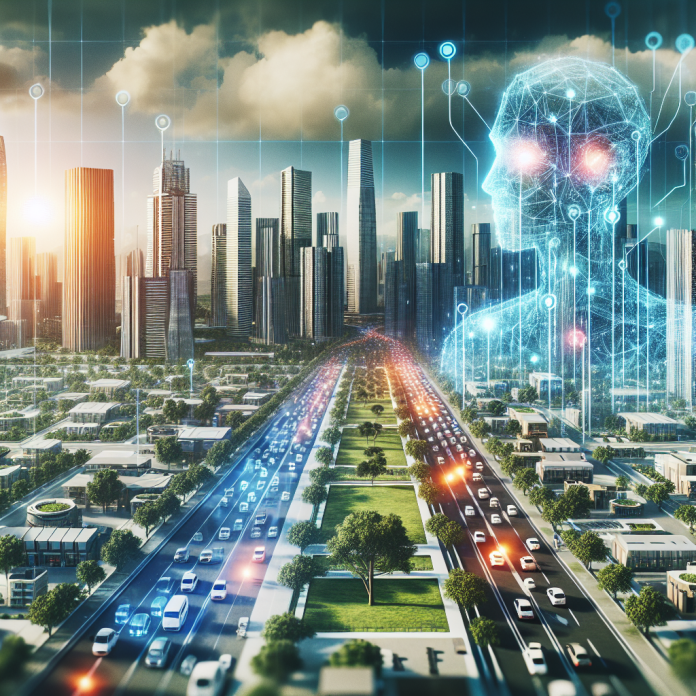AI in Urban Planning: Revolutionizing Cities of the Future
Imagine a city where traffic flows seamlessly, energy consumption is optimized, and public services are tailored to individual needs. This utopian vision of urban living is no longer a distant dream – thanks to the power of Artificial Intelligence (AI) in urban planning.
In the past decade, AI has emerged as a game-changer in the field of urban planning, offering new tools and insights that are revolutionizing the way cities are designed, developed, and managed. From optimizing traffic patterns to predicting future urban growth, AI is reshaping the urban landscape in ways that were once unimaginable.
**The Rise of Smart Cities:**
The concept of “smart cities” has gained traction in recent years, with an increasing number of cities around the world leveraging AI technology to improve efficiency, sustainability, and quality of life for residents. Smart city initiatives integrate data-driven solutions, IoT devices, and AI algorithms to address urban challenges and create more livable environments for people.
One of the key components of smart cities is the use of AI-powered systems to monitor and manage traffic flow. By analyzing real-time traffic data, AI algorithms can optimize traffic signals, reroute vehicles, and reduce congestion on roads. For example, in Singapore, AI-enabled traffic management systems have helped to reduce travel times by up to 25% and cut carbon emissions by 15%.
**AI in Urban Design:**
AI is also playing a crucial role in urban design, helping architects and planners to create more sustainable and efficient buildings. By analyzing vast amounts of data, AI algorithms can generate design solutions that maximize energy efficiency, natural light, and ventilation in buildings. This approach not only reduces resource consumption but also enhances the quality of the built environment.
For instance, in Copenhagen, AI-based software has been used to design energy-efficient buildings that generate their own electricity through solar panels and wind turbines. These smart buildings not only reduce carbon emissions but also lower operating costs for residents and businesses.
**Predictive Analytics for Urban Growth:**
One of the most powerful applications of AI in urban planning is predictive analytics, which enables city planners to forecast future trends and plan for sustainable growth. By analyzing historical data, demographic patterns, and economic indicators, AI algorithms can predict where urban growth will occur and how cities can accommodate this growth in a sustainable manner.
For example, in New York City, AI models have been used to predict population growth and identify areas of the city that are at risk of gentrification. This information has allowed city planners to design affordable housing initiatives, improve public transportation, and preserve green spaces for future generations.
**Challenges and Ethical Considerations:**
While the potential of AI in urban planning is undeniable, there are also challenges and ethical considerations that need to be addressed. One of the main concerns is data privacy and security, as AI systems rely on vast amounts of sensitive information to make informed decisions. City governments must ensure that data is collected and used in a transparent and ethical manner to protect the rights of citizens.
Another challenge is the digital divide, as not all residents have equal access to AI-powered services and technologies. City planners must ensure that AI initiatives are inclusive and equitable, reaching underserved communities and addressing social inequalities.
**The Future of AI in Urban Planning:**
As AI technology continues to advance, the possibilities for its use in urban planning are endless. From autonomous vehicles to smart grids, AI has the potential to transform every aspect of city life and create more sustainable, resilient, and equitable urban environments.
In the coming years, we can expect to see a greater integration of AI in city planning processes, with more cities adopting smart city initiatives and investing in AI-powered solutions. By harnessing the power of AI, we can build cities that are not only smarter and more efficient but also more inclusive and livable for all residents.
**Conclusion:**
In conclusion, AI is reshaping the future of urban planning, offering new tools and insights that are revolutionizing the way cities are designed, developed, and managed. From optimizing traffic flow to predicting urban growth, AI is transforming cities into smarter, more sustainable, and livable environments.
As we embrace the potential of AI in urban planning, it is crucial for city governments, planners, and residents to work together to address challenges and ethical considerations, ensuring that AI initiatives are transparent, inclusive, and equitable for all. By leveraging the power of AI, we can create cities of the future that are not only technologically advanced but also socially and environmentally sustainable. The future of urban planning is here – and it’s powered by AI.

